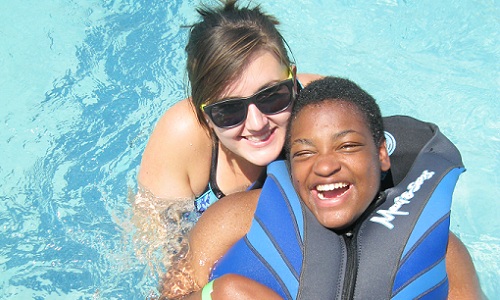
Most kids love to swim, regardless of their particular level of ability. Some children with disabilities may benefit more from one-on-one instruction (an example of this would be children along the autism spectrum who react with distress to noise, physical contact, or other types of stimuli). In general, though, there’s no reason why typical kids and those with disabilities can’t enjoy the pool together.
Who Benefits?
When kids with disabilities are included, or mainstreamed, in swimming activities with typical children, the general consensus is that everyone benefits. Typical kids become more accepting of differences, and the social skills of the children with disabilities begin to improve.
An Australian Success Story
Little Heroes Swim Academy is a non-profit facility that makes a major difference in the lives of children who have disabilities. A mainstream swimming program is conducted under the direction of Tracy Ayton, who is committed to making sure that every child is able to play safely in the water. Typical kids and those with disabilities learn together in a supportive environment.
Tracy points out that water smoothes out many of the differences between typical kids and kids with special needs. For one thing, virtually all children are instinctively drawn to water, but many don’t have any real concept of some of the dangers involved. Accordingly, drowning prevention is something that’s important for all children, whether they’re at the beach or in a community or family pool. Drowning prevention techniques are essentially the same, regardless of level of ability, since children who may have little or no ability to move on land frequently function very well in the water.
Often, parents of children with disabilities are reluctant to take them to the beach or to the pool. Much of the time this may be because it’s simply too time-consuming and difficult, or because the parent has no idea how to introduce their special needs child to the water. At Little Heroes, the staff work with parents as well as their children, offering techniques that can be practiced at home. Typically-abled kids learn along with differently-abled children, often assisting with the learning process.
Tracy would like to see Little Heroes have a site in every state in Australia, but for the time being she’s focusing on the New South Wales headquarters, where teacher training will be conducted so that swim programs can be delivered to all children, regardless of type or level of disability. Her motivation comes from working with the children and seeing the various ways in which they can overcome the challenges that they face every day. Seeing a child who can’t walk on land do so in the water is all the reward she needs.
Positive Outcomes for Everyone
Typically developing children, kids with disabilities, their parents, and even the community in general can benefit from mainstream swimming programs. Typical children become more compassionate and accepting of diversity; children with disabilities become more confident, and parents get to see their children interacting in a way that benefits everyone. When kids with disabilities are included in swimming programs with typical kids, we’re all better for it.
ABOUT SUNSATIONAL SWIM SCHOOL
Sunsational Swim School is the 🥇 #1 rated provider of private, at-home swimming lessons in America. We have specialized swim instructors for students ages 6 months to adult, beginner to advanced. Featured on ABC, CBS, Impact 100, The List and others, Sunsational instructors have a minimum of 2 years of teaching experience, are CPR certified and insured, and have collectively taught over 302,223 lessons for more than 74,415 students nationwide!

